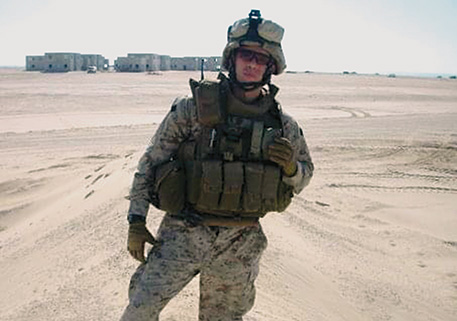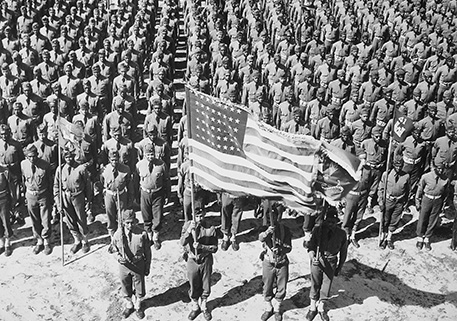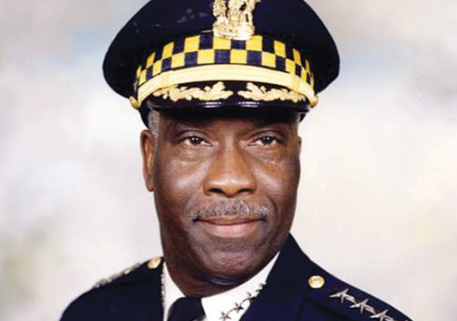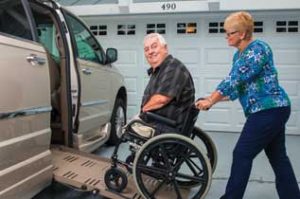
Veterans, caregivers benefit from new initiative
Twelve years ago, Donna Joyner had to make a difficult decision when her husband, Dennis, needed rotator cuff surgery on his shoulder. When his arm was put out of commission, Dennis—a triple amputee who was injured during his Army service in Vietnam—temporarily lost the use of his last remaining limb along with his ability to push his wheelchair.
Donna, who worked for the DAV Department of Florida, chose to resign from her full-time position to take on the full-time role as her husband’s caregiver—a role she had already been performing throughout their 40 years of marriage.
“It was really tough because that decision was made in about a day and there was no choice,” said Donna. “We just dealt with it. And, you know, at first I was furious. I had two years until I actually would get a pension, and everything went out the window. At first I was like, ‘Gee, what else?’ Then I thought of my husband whom I would do anything for. It’s just what you do.”
For the next 12 years, the Joyners kept moving forward with no formal medical training and no means of compensation for Donna’s role as a caregiver, including her lost wages and retirement income. Dennis, a member of Chapter 16 in Orlando who served as DAV national commander from 1983 to 1984, not only personally knew the importance of having a family caregiver but also knew the struggle that thousands of others like them faced.
The Joyners finally found relief last year. After years of helping DAV’s push for disabled veterans of all eras to be made eligible for the Department of Veterans Affairs’ Program of Comprehensive Assistance for Family Caregivers—the program that provides training for caregivers, along with a modest stipend and respite care, among other resources—the expansion of which began Oct. 1. On that date, in accordance with the VA MISSION Act of 2018, the VA began accepting program applications from Phase 1 veterans, those whose injuries or illness was incurred on or before May 7, 1975.
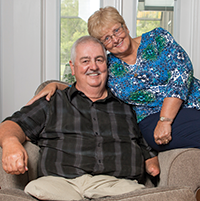

“It provides a lot of different resources,” said Dennis. “It provides contact with the caregiver’s office in your area. You can call and talk with someone if you need advice, assistance, or they can help you figure out certain things.”
In addition to an extensive training program, caregivers like Donna have answers and support for issues that have loomed over them for decades.
“It was quite scary, not knowing what would happen to Dennis should something happen to me,” said Donna. “Thankfully, I did have family backing me up. However, I think of all the people that don’t have that, and where do they go? Now they have a resource to go to. Now, I can turn to the caregiver program and say, OK, we need some help in this direction.”
“The expansion of the comprehensive caregiver program for families like Dennis and Donna Joyner has made a world of difference in their day-to-day lives and provided more peace of mind about the future,” said DAV National Legislative Director Joy Ilem. “This program provides needed training, support from VA staff, and tips that remind caregivers it is important to take care of themselves so they can provide the best care for their veteran or loved one. Dennis can rest assured that if Donna is no longer able to care for him at some point, there are now other options. For Donna, just the acknowledgment and support this benefit brings helps her continue on in this critical role and feel like she is not alone anymore.”
Along with the changes to the caregiver program, the Campaign for Inclusive Care, created to actively include caregivers in veterans’ medical care, will now begin to filter across the VA. The campaign, in partnership with the Elizabeth Dole Foundation, aims to equip medical professionals with training to better support both veterans—specifically those receiving geriatric, polytrauma and traumatic brain injury care—and their caregivers.
Veterans with a 70% or higher single or combined service-connected disability rating are considered eligible within the Campaign for Inclusive Care.
For the Joyners, changes like these have been a long time coming, and despite the decades of financial difficulty and emotional strain, the support comes at a crucial time for them and for many veterans of Vietnam, Korea and World War II.
“You take on a lot when you’re a caregiver,” said Donna. “I might be getting older, but I’m doing probably more than ever.”
Learn more
Learn more about the VA’s Program of Comprehensive Assistance for Family Caregivers at dav.la/2ls and the Campaign for Inclusive Care at dav.la/2lt.

